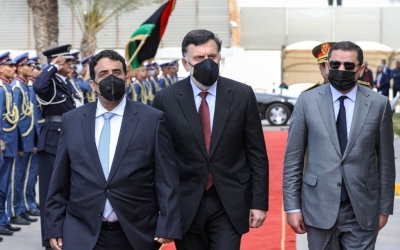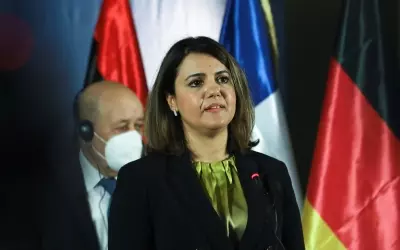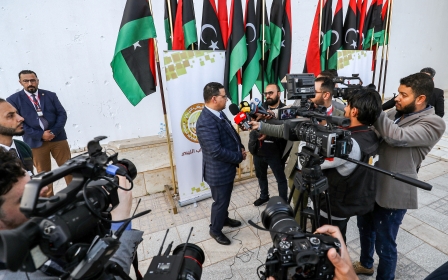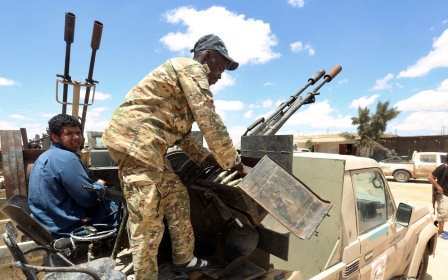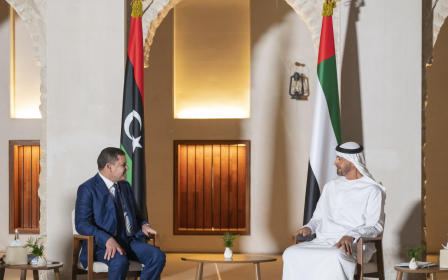Biden's lack of Libya policy leaves room for other foreign powers, experts say
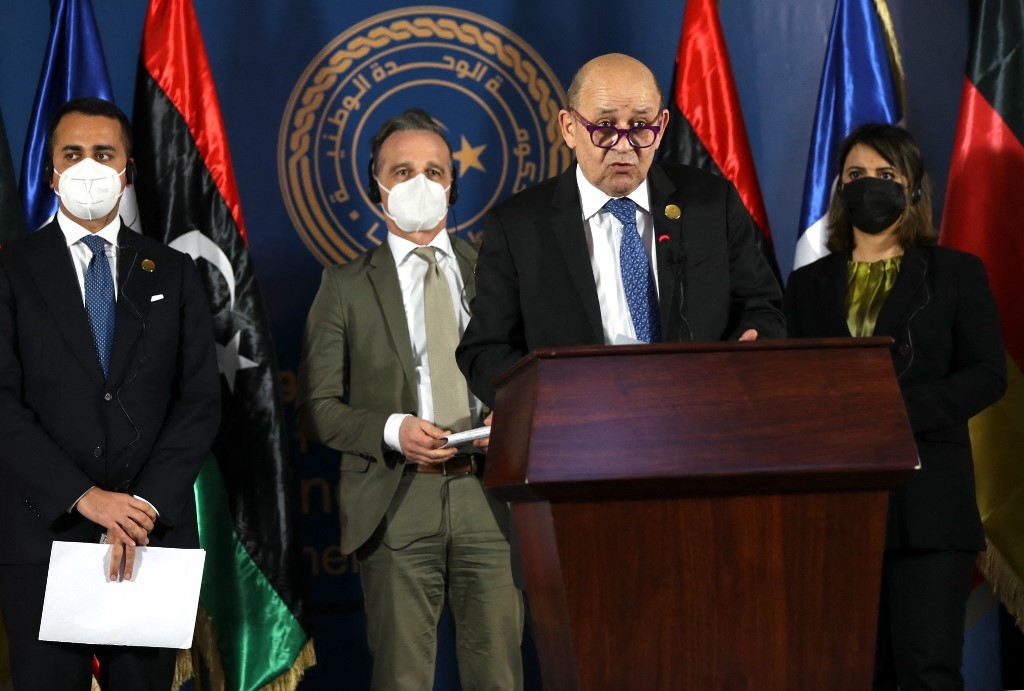
As US President Joe Biden nears his 100th day in office, the absence of a clear White House policy towards Libya has allowed several countries to expand their influence in the north African country ahead of elections slated for later this year, experts have said.
So far, the administration has issued only a handful of statements regarding Libya, mostly remarks in support of a United Nations-led peace process.
The relative silence is not surprising, given the White House has quietly signalled a shift from the Middle East to confronting China in Asia and the Asia-Pacific region more generally.
Still, the administration has been accused of playing an unnecessarily passive role concerning Libya, having issued significant policy announcements regarding other areas in the Middle East, including ending US support to the Saudi-led coalition's offensive operations in Yemen, and entering indirect negotiations for a return to the Iran nuclear deal.
"What is noticeable is that the Biden administration has been very vocal and present in other conflict files," Claudia Gazzini, a consulting analyst on Libya for the International Crisis Group, told Middle East Eye.
"But we haven't seen that same level of engagement on Libya," Gazzini said.
Following years of war between rival powers, Libya has entered into a new phase following a ceasefire agreement last October, which led to the formation of the Government of National Unity (GNU) last month. The country is scheduled to hold elections on 24 December which would solidify the country's unification.
Emadeddin Badi, a political analyst focused on Libya, said the US had increased its role since October by issuing support for the ongoing political process, but currently has no presence in or engagement with the country.
"Owing to the fact that it has virtually no presence on the ground, its level of leverage in comparison with other players is limited," Badi told MEE.
This lack of a pronounced Libya policy has come as other countries, including Turkey, Egypt, and some European nations, have been working to increase relations with the new unity government.
Libya's power brokers
Since the 2011 Nato-backed ousting of longtime Libyan leader Muammar Gaddafi, the intervention of foreign powers has created a complex proxy war between foreign entities amid what was an already chaotic civil war.
Turkey and Qatar backed the UN-recognised Government of National Accord (GNA) which controlled the capital, Tripoli, and large parts of the country's west, while forces loyal to eastern commander Khalifa Haftar were supported by Russian mercenaries, Egypt, the United Arab Emirates and some European powers.
The foreign interventions led, experts say, to Turkey and Egypt, who have both been cultivating diplomatic and economic ties in addition to asserting their military footprints in the country, to become power brokers in Libya.
"The reality is that the positioning of these countries will have a major impact over the success or failure of the newly selected government," Tim Eaton, a senior research fellow with Chatham House's MENA Programme, said of Ankara and Cairo.
'The EU only reacts to Libyan developments, a dynamic which has de-facto allowed other players to garner disproportionate influence'
- Emadeddin Badi, political analyst
Turkey's intervention on behalf of the GNA played an instrumental role in turning the tide against Haftar's offensive on Tripoli, which led to October's ceasefire agreement and subsequent formation of the new government. The victory has also allowed Ankara to maintain special forces and de-facto bases in the country.
In addition to wanting a stable and representative government for the country, Gazzini said Turkey also wanted "a government that respects the maritime agreements that were signed in 2019 with Libya".
Earlier this month, after Libya's Prime Minister Abdulhamid Dbeibeh met with Turkish President Recep Tayyip Erdogan, the two sides committed to the 2019 maritime border delineation agreement, which set the boundaries between the two countries in the Mediterranean, as well as boosting trade and economic ties.
Egypt, which has been at loggerheads with Turkey, similarly aims for stable governance and cementing economic opportunities, including reconstruction contracts for the war-torn country.
"There are a lot of Egyptian workers in Libya. Many of them returned to Egypt, but it's a good source of revenue for its population," Gazzini said.
While Cairo hedged its bets on Haftar succeeding in taking over Tripoli, the government has since pledged support for the new government.
Egyptian Prime Minister Mustafa Madbouly visited Tripoli last week and met with Dbeibah, where the two signed a number of agreements on electricity, telecommunications, infrastructure, health and education.
Europe's role as a 'reactive bystander'
Since fighting abated, several European countries have also been vying for leadership roles by supporting the ongoing political process.
Last month, the foreign ministers of Germany, France, and Italy paid a visit to Tripoli, in a show of support for the transitional government. The president of the European Council also visited.
During the trip, diplomats from the three countries alluded to the ongoing peace process having been a direct result of their own efforts, and pledged support for the new government.
"We are therefore pleased to see our efforts bear fruit. There have been meetings in Paris and Palermo, and a conference in Berlin which has helped launch a process, and today we are seeing the first results," French Foreign Minister Jean-Yves Le Drian said during a news conference.
However, Dario Cristiani, a senior fellow at the German Marshall Fund, and Karim Mezran, senior fellow at the Atlantic Council, noted that the Europeans were clearly overprojecting their influence in Libya.
"European countries had a marginal role, as they lacked the capacity and willingness to influence dynamics on the ground by playing by the rules of the game: unfortunately, this game was a military one," Cristiani and Mezran wrote earlier this month, pointing out that Turkey's military intervention helped paved the way for a ceasefire and political process.
Badi, the Libya political analyst, noted Europe's role in Libya remained "that of a bystander".
"The EU only reacts to Libyan developments, a dynamic which has de-facto allowed other players to garner disproportionate influence in comparison to it," he said.
France sowed EU disunity in Libya
According to experts, France helped complicate the situation in Libya by cultivating strong ties with Haftar, despite having officially recognised the GNA alongside its fellow European countries and the US.
Now with the advent of the new unity government, Paris seems to have taken a turn, with the country reopening its embassy in Tripoli this month. In announcing the move, French President Emmanuel Macron said France owed "a debt to Libya and the Libyans for a decade of disorder", referring to the 10 years of chaos that followed the fall of Gaddafi.
"With the advent of the GNU, France's diplomacy has - much like other European states - adapted and welcomed the new executive," Badi said.
Yet the Libya analyst noted that "old habits die hard", and with the GNU currently appearing to face similar problems in working with Haftar - Prime Minister Abdelhamid Dbeibah this week called off a trip to Benghazi, Haftar's stronghold - France may once again return to supporting the eastern commander:
"It is extremely likely that France will once again return to its long-standing policy of providing him support, irrespective of the fact that this jeopardises an already precarious transition."
What the US can do for Libya
Despite the relative lack of engagement from the Biden administration, analysts note there are still policies the White House can pursue to help Libya maintain the relative the stability it has achieved in recent months.
One of the most pressing issues is the presence of foreign fighters, with Chatham House's Eaton saying the US had the capacity to force the departure of those fighters, citing the example of the administration ending support for the Saudi-led coalition's offensive operations in Yemen, as well as freezing arm sales to Riyadh.
"It would illustrate to the external meddlers [in Libya] that the Biden administration will scrutinise their activities and potentially hold them to account," Eaton said.
A senior Biden administration official told Politico this month that it was "upping its game diplomatically" when it comes to the issue of foreign forces in Libya.
The administration could also, analysts say, take a more assertive approach to Khalifa Haftar, as seen with the State Department's recent human rights report, which outlined abuses conducted by Haftar and his militias, which it referred to as non-state actors.
Still, the administration has largely remained quiet on Haftar, and the senior official told Politico that the issue of dealing with the eastern commander was "a question that the Libyan people need to decide through the December election", and that the US was focused on ensuring a fair election took place.
Middle East Eye delivers independent and unrivalled coverage and analysis of the Middle East, North Africa and beyond. To learn more about republishing this content and the associated fees, please fill out this form. More about MEE can be found here.


